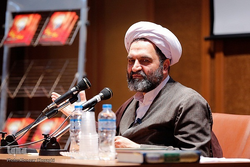No Compulsion in Religion According to Seerah of Holy Prophet


This is according to the Muslim scholar Hojat-ol-Islam Mohammad Soroush Mahalati, speaking at a forum on the Holy Prophet’s (PBUH) mission. Excerpts from his speech are as follows:
It is understood from the verses of the Quran that the Holy Prophet (PBUH) has no mission other than Tabligh (propagation). Whether or not people will accept the message is up to them. So the Prophet (PBUH) did not impose religiosity on people and did not use any means of coercion and pressure in this regard.
There are many verses pointing to this fact. Some of these verses highlight the fact that the Prophet (PBUH) has no other responsibility than Tabligh. According to another group of verses, Tabligh is the Prophet’s (PBUH) mission and if people turn away from him, his mission is over. Some other verses say it is God’s will that people become believers with their own choice and based on free will.
Fiqh, which shows the practical way of being religious, should first indicate what means should be used to help people become religious.
There are three types of analysis and explanation about these verses. The first one says these verses are Makki and the Prophet’s (PBUH) mission in Mecca was Tabligh only but in Medina he had another responsibility.
The second view says that these verses are about accept Islam. That is to say, the Prophet (PBUH) does not force people to become Muslims. One is free to accept or reject Islam but when people become Muslim, being committed to its rules is necessary. One is free to enter or not to enter a country, but if he chose to enter it, that means he has accepted its rules.
The third view states that there is a distinction between divine rules and what the Prophet (PBUH) orders. What God has ordered depends on people’s free will to follow or reject. But when there is a religious government, people must follow the orders of the government.
As for the first view, it should be rejected since there are such verses not only in Makki Surahs but also in Madani ones.
Regarding the second view, we should refer to verse 92 of Surah Al-Ma’idah: “Obey Allah, and obey the Messenger. Beware; if you give no heed, know that Our Messenger's duty is only to give the clear delivery.”
According to this verse, the Prophet (PBUH) only delivers the message and it is up to people to obey or not. So this verse refutes the second and even the third view.
The Quran says in another verse: “Whosoever obeys the Messenger, indeed he has obeyed Allah. As for those who turn away, We have not sent you to be their protector.” (Surah An-Nisa, Verse 80)
The Quran refers to people’s refusing to obey the Prophet (PBUH) but tells the Prophet (PBUH) to let them decide themselves.
Therefore, these verses show that the Prophet (PBUH) does not impose anything on people regarding both divine rules and Wilayi rules.



